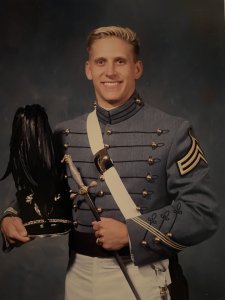A personal war ended for retired Army Maj. Darren Baldwin when he passed away in December 2021. After 17 years of fighting through injuries caused by blasts in Iraq, his wife, Bianca, knows he’s finally at peace.
Now she’s continuing the battle for others.
The Department of Veterans Affairs estimates 41% of post-9/11 veterans have disabilities. Silver Star families are those loved ones of service wounded, ill or injured in the line of duty for our nation. Though recipients of the military’s third-highest combat decoration receive recognition, like Baldwin did, sometimes support fades along with the uniform they no longer wear.
READ: Foundation reunites combat veterans and Gold Star families
But long before IEDs stole his ability to move or speak, Baldwin was a handsome young soldier with a twinkle in his eye and a leather jacket.
“I’m from Germany and he was stationed in the city where I was going to university,” Bianca explained. “I was out with my girlfriends and it was tequila night. Typically, they don’t let Americans, Turks or Russians in the bar because they start fights.”
But Baldwin spoke perfect German and made his way inside.
“I looked over and saw this guy swinging his leather jacket like he was John Travolta in ‘Grease,’” she laughed. Before long they were dancing and talking, and although he lost his jacket, he got her number.

Baldwin grew up in Ohio and graduated from West Point in 1998. After witnessing the 9/11 terrorist attacks from his unit in Germany, he decided to pursue Special Forces and graduated as a Green Beret in 2003.
During his second tour in Iraq in March 2005, Baldwin sustained his first traumatic brain injury from a roadside IED. Two weeks later, there was another.
“When he got hit the first time everything went radio silent,” Bianca shared. “But then he called me and said he was fine. A few days later he said he was feeling nauseous and having headaches. I told him he needed to go see someone at medical and he did. But they just gave him IV fluids and a Z-Pack of antibiotics.”
Baldwin returned home in June, and Bianca said she immediately knew things weren’t right.
“He was short-tempered, there were personality changes and he was getting off balance a lot,” she said. “But he didn’t want to go see anyone, and it wasn’t terrible yet. He was still running, but sometimes he’d call me and I’d have to pick him up because he’d gotten so dizzy, he couldn’t get back.”
The following year, Baldwin deployed again, but the assignment ended when he was offered the position of aide-de-camp to the Army Special Forces commanding general at Fort Bragg, North Carolina.
“It was the best thing that could have happened because he had to do out-processing to get ready for Bragg. Darren finally told the group surgeon he’d been having issues and they did a brain scan,” Bianca said.
That’s when they found more than 60 lesions on his brain.
A new battle begins
A journey began as they consulted with medical professionals who threw out diagnoses like brain cancer, multiple sclerosis or infection.
“It literally looked like someone threw confetti all over his brain,” Bianca added.
From there, he was sent to Walter Reed Medical Center, but research into traumatic brain injuries was still in its infancy, as was the technology to detect the impacts. The couple continued fighting for the proper diagnosis and treatment but was eventually told by a neurologist if they went any further, medical discharge would begin.
“Darren was scared of losing his career because he loved what he did and it’s how he identified himself,” Bianca explained. “Now, he was a wonderful husband and loved me, but he didn’t want to lose that.”
When the couple made the trek from Fort Carson, Colorado, to Fort Bragg, North Carolina, the headaches and sickness progressed –– all while Baldwin continued to work and serve. By 2009, things weren’t manageable anymore, and he finally told his command what was happening. This is when Baldwin and Bianca began working with the Care Coalition, The 98 Fund (started by his West Point classmates) and the Green Beret Foundation.
In September 2013, Baldwin medically retired with a combat-related injury. At this point, he could not walk and slowly lost his ability to speak. The costs for treatments not covered now that he’d left active-duty began mounting.
“It feels like our service members needing long-term care tend to fall by the wayside,” Bianca said. “I don’t want to say people forget about you, but they don’t really see what’s going on. Once you leave places like Walter Reed, it’s all on you and your life changes forever.”
Despite the significant injuries and changes to Baldwin’s quality of life, Bianca said he was always smiling.
“We had a good life, but it was still challenging all the time,” she said.
From navigating TRICARE for Life, VA benefits and eventually, Medicare, it was a constant battle to ensure Baldwin received what he needed.
“A lot of veterans don’t have what we did and they tend to get lost in the sauce,” said Bianca. “This is why we see marriages fail and families falling apart.”
The two became trailblazers in advocating for Silver Star Families, and it’s a fight Bianca says she is committed to continuing, for Baldwin.
Though he spent more than a decade struggling with his severe injuries as a result of war, he told his mother, Fran Baldwin-Wesseling, something profound before he lost his speech.
I’d do it all over again.
 Bianca expressed how the pandemic, and eventually watching the crisis and bombing at the end of the Afghanistan withdrawal, took its toll on Baldwin. By the end of summer 2021, he’d entered hospice. The couple was able to make one last trip to the beach, where they’d made a promise to fight his injuries together so many years before.
Bianca expressed how the pandemic, and eventually watching the crisis and bombing at the end of the Afghanistan withdrawal, took its toll on Baldwin. By the end of summer 2021, he’d entered hospice. The couple was able to make one last trip to the beach, where they’d made a promise to fight his injuries together so many years before.
“In his way, he told me he was ready to put his weapons down and end the war,” Bianca shared through tears. “But even in his last hours he didn’t want to let go because he just loved life so much. I prayed with him and to God to give him the strength to know it was OK to let go. And he did.”
Read comments






































